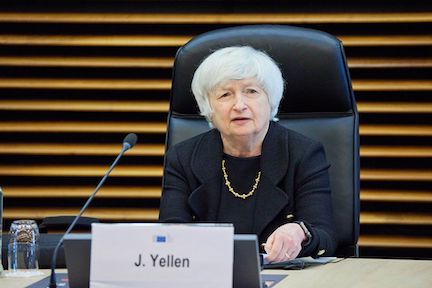Yellen looks to revive US-EU ties in facing down China, Russia
Treasury Secretary Janet Yellen made a new push in Brussels to repair U.S. ties with the European Union, urging members of the bloc to help confront China and Russia.
In her first visit as Treasury chief to the European capital, Yellen hearkened back to the partnership and “rules-based international order” constructed after World War II—before calling out three countries she said imperiled that order.
“Together, we need to counter threats to the principles of openness, fair competition, transparency and accountability,” Yellen said in remarks she’s scheduled to deliver to EU finance ministers Monday.

“These challenges include China’s unfair economic practices, malign behavior, and human rights abuses; the Lukashenka regime’s ongoing abuses in Belarus; and Russia’s continued and growing malign behavior,” she said in some of her most pointed criticisms to date of Moscow and Beijing.
The remarks underscore the intentions of President Joe Biden to mend trans-Atlantic bonds that were severely strained under Donald Trump. The former president confronted China aggressively on economic issues, but also escalated trade conflicts with the EU and placed little stress on human rights. The U.S. is calling for more cooperation with the EU on economic, tax and climate issues.
Yellen arrived in Brussels Sunday afternoon following a Group of 20 gathering of finance ministers and central bankers in Venice, where the world’s largest economic powers endorsed a ground-breaking plan to revamp the rules on global corporate taxation.
China stood in “firm opposition to the remarks,” Foreign Ministry Spokesman Zhao Lijian said Tuesday at a regular press briefing in Beijing.
“China has supported multilateralism and the multilateral trade regime with the WTO at its core, and conducted international trade and economic cooperation based on the principles of equality and mutual benefits,” he said. “We don’t exercise bullying, sanctions or long-arm jurisdiction, nor do we suppress enterprises without any reason.”
Tax Deal
The deal, which nations seek to finalize at a G-20 leaders’ summit in Rome in October, aims to stop major corporations from moving to low-tax jurisdictions through a global minimum tax, and to establish a fairer system for distributing the taxation of multinational firms.
Ahead of her speech Monday, Yellen scored a win when the EU said it would postpone its push for a digital levy to focus on broader negotiations over the tax deal. The U.S. has said the planned digital tax may discriminate against U.S. tech giants and thus violate the pending tax agreement.
Yellen made no reference to that dispute in her remarks but did address EU members who have objected to a global minimum corporate tax also included in the proposed deal. Ireland, Hungary and Estonia have so far refused to sign up to the minimum tax, creating a potential roadblock because of the need for unanimity on tax issues within the EU.
“We hope all EU member states will join the consensus and the European Union will move forward on this issue,” she said.
The Biden administration is counting on the global tax revamp to help support a $4 trillion economic agenda in the U.S.
Spending Plea
Yellen made clear the U.S. believes EU members should be spending more while the global economy remains threatened by the Covid-19 pandemic.
“It is important that the fiscal stance remain supportive through 2022,” she said, and urged EU members to “seriously consider additional fiscal measures to ensure a robust domestic and global recovery.”
She made no reference to fears over inflation in the U.S. or abroad and the subject drew little public discussion among G-20 officials in Venice.
Yellen stressed the need for the U.S. and EU to help poorer countries contain and recover from the pandemic, and also to support their efforts to reach climate goals.
“Both the United States and the European Union have the tools to help less-developed countries achieve their emissions reduction goals, and we should work together to drive emissions reductions in these markets,” she said.
Similar Stories

Amaero secures final approval for $23.5M loan from Export-Import Bank
View ArticleU.S. Bureau of Labor Statistics employment situation
Total nonfarm payroll employment increased by 256,000 in December, and the unemployment rate changed little at 4.1 percent, the U.S. Bureau of Labor Statistics reported today. Employment trended up in…
View ArticleImport Cargo to remain elevated in January
A potential strike at East Coast and Gulf Coast ports has been avoided with the announcement of a tentative labor agreement, but the nation’s major container ports have already seen…
View ArticleS&P Global: 2025 U.S. transportation infrastructure sector should see generally steady demand and growth
S&P Global Ratings today said it expects activity in the U.S. transportation sector will continue to normalize in 2025, with growth rates for most modes of transportation slowing to levels…
View Article
CBP officers seize counterfeit Tiffany & Co. jewelry
View ArticleAAFA applauds USTR on the 2024 Review of Notorious Markets for Counterfeiting and Piracy report
Reiterates need for accelerated efforts to stop dangerous fakes
View ArticleGet the most up-to-date trending news!
SubscribeIndustry updates and weekly newsletter direct to your inbox!





